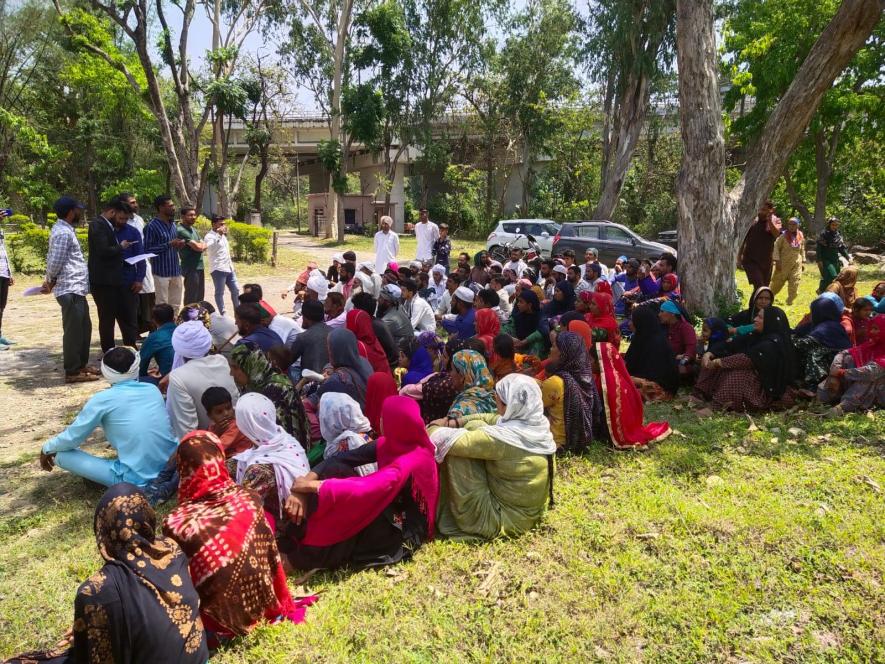On May 25, 2023 the Uttarakhand Forest Department admitted that the eviction notices issued to Van Gujjars were erroneously issued. The Van Panchayat Sangharsh Morcha had highlighted in a letter to the state government that eviction notices were being issued by Van darogas when the Indian Forest Act mandates that such notices be issued only by the Divisional Forest Officer.
Now, in an order dated May 25, the Forest Department has flagged procedural violations in the issue of these eviction notices. It directed the officials to note that their settlements, known as Khattey, can be removed only when proper provisions are made for their resettlements, reported The Hindu.
Van Gujjars from several villages in the Terai East and West Divisions had received such eviction notices. However, when TOI spoke to forest range officer Laxman Singh Martolia of Bannakheda range in Terai West division, he said, “The letter were solely intended to inform them that anti-forest activities would not be tolerated within the forest area.”
The Uttarakhand Forest Department had issued eviction notices to approximately 400 Van Gujjars to vacate their houses as a part of a drive to clear encroachments on forest property, like religious places, settlements or any other structures that cropped up illegally. It is also pertinent to note that most of these Van Gujjars belong to the Muslim community.
Van Gujjars are nomadic forest dwelling pastoral communities residing in Uttarakhand. The Van Gujjars of Uttarakhand mark the onset of summer season with their annual migration to the Himalayan ‘bugyals’ or meadows, and in the winter season they move towards the lower mountains of the Shivalik range. As reported in Times of India, Van Panchayat Sangharsh Morcha (VPSM), an organization working towards safeguarding the rights of the forest dwellers has written to the Principal Forest Secretary requesting the Government to halt the displacement of these forest dwellers and highlighted the procedural issues and lapses in the orders. Tarun Joshi, a member of VPSM highlighted one of the issues as “such notices can be issued by an officer holding the rank of a divisional forest officer”. As reported in the Times of India, on May 22, around 100 Van Gujjars, including women and children protested the order “to immediately vacate the land” in Ramnagar, Nainital district.
The Van Gujjars have stated that their claims filed under the Scheduled Tribes and Other Traditional Forest Dwellers (Recognition of Forest Rights) Act, 2006 (also known as the Forest Rights Act) are still pending with the government.
The Forest Rights Act, 2003
The Section 3 of Forest Rights Act, 2003 recognizes the right of the forest dwellers to ‘hold and live in the forest land under the individual or common occupation for habitation or for self-cultivation for livelihood by a member or members of a forest dwelling Scheduled Tribe or other traditional forest dwellers’. Further, Section 4 of the Act clearly states that in case they are residing in ‘critical wildlife habitats of National Parks and Sanctuaries’ these forest dwellers need to be rehabilitated first.
Further, the Guidelines on the implementation of Forest Rights Act issued by the Ministry for Tribal Affairs clearly state,
“Section 4(5) of the Act is very specific and provides that no member of a forest dwelling Scheduled Tribe or other traditional forest dwellers shall be evicted or removed from the forest land under his occupation till the recognition and verification procedure is complete. This clause is of an absolute nature and excludes all possibilities of eviction of forest dwelling Scheduled Tribes or other traditional forest dwellers without settlement of their forest rights as this Section opens with the words “Save as otherwise provided”. The rationale behind this protective clause against eviction is to ensure that in no case a forest dweller should be evicted without recognition of his rights as the same entitles him to a due compensation in case of eventuality of displacement in cases, where even after recognition of rights, a forest area is to be declared as inviolate for wildlife conservation or diverted for any other purpose. In any case, Section 4(1) has the effect of recognizing and vesting forest rights in eligible forest dwellers. Therefore, no eviction should take place till the process of recognition and vesting of forest rights under the Act is complete.”
They further lay down, “in view of the provisions of Section 4(5) of the Act, no eviction and resettlement is permissible from the National Parks and Sanctuaries till all the formalities relating to recognition and verification of their claims are completed.”
It is the duty of the State Level Monitoring Committee to ensure that these guidelines are followed.
Uttarakhand High Court order
In the Think Act Rise Foundation through Arjun Kasana vs State of Uttarakhand and Ors. Writ Petition (PIL) No. 140 of 2019 (order dated 25th May 2021) the Uttarakhand High Court through an interim order upheld the right of a qafila (caravan) of Van Gujjars to migrate to their summer homesteads in the bugyals (Himalayan alpine meadows) in the Govind Pashu Vihar National Park in Uttarkashi district. The court noted,
“It is, indeed, trite to state that Article 21 of the Constitution of India forbids the State from reducing the lives of its people below the animal existence. Every citizen not only has a right to live, but also has a right to live with dignity.”
The eviction notices to the Van Gujjars again show an attempt on the part of the state to remove them from their lands which in itself is violative of Article 21 of the Constitution and their rights under the Forest Rights Act, 2006.
Related:
A Day in the Life of Van Gujjars
HC order empowers Van Gujjars during Covid-19
Bullets and bureaucracy: Van Gujjars of Shivalik hills are caught in the crosshairs
